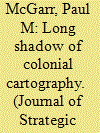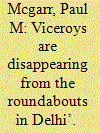|
|
|
Sort Order |
|
|
|
Items / Page
|
|
|
|
|
|
|
| Srl | Item |
| 1 |
ID:
143000


|
|
|
|
|
| Edition |
South Asian ed.
|
| Publication |
DelhI, Cambridge University Press, 2013.
|
| Description |
xii, 391p.: mapshbk
|
| Standard Number |
9781107150560
|
|
|
|
|
|
|
|
|
|
|
|
Copies: C:1/I:0,R:0,Q:0
Circulation
| Accession# | Call# | Current Location | Status | Policy | Location |
| 058420 | 327.54009/MCG 058420 | Main | On Shelf | General | |
|
|
|
|
| 2 |
ID:
105217


|
|
|
|
|
| Publication |
2011.
|
| Summary/Abstract |
From 1947 until his political demise in late 1962, Vengalil Krishanan Krishna Menon stood at the forefront of India's international relations. One of Indian Premier Jawaharlal Nehru's closest political confidantes, Menon served variously as India's High Commissioner to the United Kingdom, leader of its delegation to the United Nations, self-styled mediator in the Korea, Indo-China, and Suez crises of the 1950s and, from 1957, his country's Defence Minister. Vilified in the West as "India's Rasputin," Menon's left-wing credentials, anti-colonial rhetoric, and willingness to engage with the Communist bloc were seen by Anglo-American diplomats as a threat to Western interests in South Asia. Drawing upon recently released British and American archival records, this article argues that Western misperceptions of Menon, and his role in the Indian foreign policy-making process, undermined Anglo-American relations with India for much of the early Cold War.
|
|
|
|
|
|
|
|
|
|
|
|
|
|
|
|
| 3 |
ID:
164659


|
|
|
|
|
| Summary/Abstract |
This article examines British responses to the Sino-Indian border war of 1962. It illustrates how, in the years leading up to the war, Britain’s colonial legacy in the Indian subcontinent saw it drawn reluctantly into a territorial dispute between Asia’s two largest and most powerful nations. It analyses disagreements in Whitehall between the Foreign Office and Commonwealth Relations Office over the relative strength of India and China’s border claims, and assesses how these debates reshaped British regional policy. It argues that the border war was instrumental in transforming Britain’s post-colonial relationship with South Asia. Continuing to filter relations with India through an imperial prism proved unsatisfactory, what followed was a more pragmatic Indo-British association.
|
|
|
|
|
|
|
|
|
|
|
|
|
|
|
|
| 4 |
ID:
139688


|
|
|
|
|
| Summary/Abstract |
In the aftermath of the Second World War, as post-colonial regimes in Africa and Asia hauled down imperial iconography, to the surprise and approval of many Western observers, India evidenced little interest in sweeping away remnants of its colonial heritage. From the late 1950s onwards, however, calls for the removal of British imperial statuary from India's public spaces came to represent an increasingly important component in a broader dialogue between central and state governments, political parties, the media, and the wider public on the legacy of British colonialism in the subcontinent. This article examines the responses of the ruling Congress Party and the British government, between 1947 and 1970, to escalating pressure from within India to replace British statuary with monuments celebrating Indian nationalism. In doing so, it highlights the significant scope that existed for non-state actors in India and the United Kingdom with a stake in the cultural politics of decolonization to disrupt the smooth running of bilateral relations, and, in Britain's case, to undermine increasingly tenuous claims of continued global relevance. Post-war British governments believed that the United Kingdom's relationship with India could be leveraged, at least in part, to offset the nation's waning international prestige. In fact, as the fate of British statuary in India makes clear, this proved to be at least as problematic and flawed a strategy in the two decades after 1947 as it had been in those before.
|
|
|
|
|
|
|
|
|
|
|
|
|
|
|
|
|
|
|
|
|